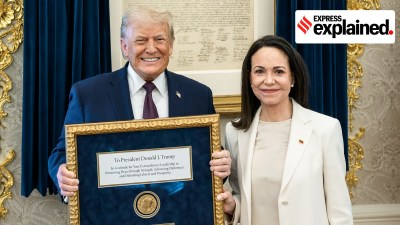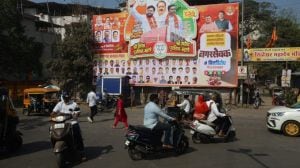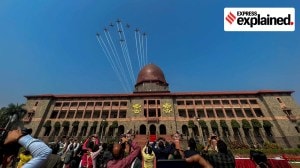Northeast alert
Indo-Pakistan comprehensive dialogue appears to be set to make progress. There is general satisfaction on the talks between Prime Minister M...

Indo-Pakistan comprehensive dialogue appears to be set to make progress. There is general satisfaction on the talks between Prime Minister Manmohan Singh and General Pervez Musharraf. There is also an increase in the people to people contact, the latest being the visit of Pakistani journalists to Jammu and Kashmir. The hostile rhetoric between New Delhi and Islamabad has been significantly toned down. It has been claimed that cross border infiltration across the Line of Control has come down. The Indian defence minister attributes this partly to border fencing and better technical methods of surveillance. There is, therefore, a sense of quiet optimism about the future of Indo-Pakistan relations. The traditional wisdom would advise our policy makers and agencies to do their best to build on this positive mood but at the same time to continue our vigil.
While adversaries often do become friends, it does not happen in the short term nor without a wide range of interaction between two societies. Even as we breathe a sigh of relief on the western front, the security situation in the Northeast has deteriorated sharply and the country has seen a large number of casualties to terrorist outrages since the Dhemaji school bomb explosion on Independence Day, when children were deliberately targeted. Simultaneous explosions in Dimapur and Assam and the continuing instability in Manipur have suddenly focussed the entire nation8217;s attention on the Northeast.
A professional intelligence assessor will raise the question whether these two developments in the west and east of India are totally unrelated. For all we know they may be, but the question must be raised and fully explored. Observers of the global terrorism scene are of the view that there are linkages between Al-Qaida activities in Iraq, in Pakistan, in Southeast Asia and elsewhere. There is also a well-informed opinion that many jehadis have obtained safe haven in Bangladesh and they are in touch with a number of Indian insurgent organisations operating in the Northeast. At present, the US is on maximum alert and so also Europe against jehadi terrorism. The US is putting all the pressure it can on the Pakistan government to control the jehadis. In such circumstances, would it not be reasonable to expect that the jehadis are driven to encourage their terrorist associates to strike at northeast India?
This scenario may be dismissed as mere speculation by liberals who want to see no evil, hear no evil or speak no evil. But for professional assessors this has to be analysed and ruled out on the basis of available evidence. Recently, in the US, as a result of recommendations of the 9/11 commission, there is a proposal to decentralise assessments into six centres. The security situations in J038;K and the Northeast would justify separate assessment centres with teams of specialists devoting themselves to whole time assessment of the situation. Unfortunately our political leadership, irrespective of the party in power, do not seem to realise the importance of assessment as the crucial management tool for ensuring national security. The old Joint Intelligence Committee has been saddled with other tasks. Further the political leadership is not sensitive to the recommendation that the National Security Council NSC should have a fortnightly briefing of overall intelligence assessment covering different areas of national security interest. There is a lackadaisical attitude that if some crisis was anticipated then the security agencies should bring it to the attention of the ministers. If the members of NSC are not willing to be in continuous touch with the security situation in various parts of the country, one cannot expect them to develop the degree of sensitivity needed to handle various security crises with the degree of political sophistication and sensitivity expected of them. This is what one saw during the recent Manipur crisis. Nor can they be expected to have a holistic picture of all factors that contribute to the crisis 8212; such as ethnic tensions, illegal immigration, immigration, smuggling and organised crime, political corruption, drug trafficking and extra-territorial covert intervention.
There is, therefore, a need to staff the NSC adequately. I am told that one of the objections raised by those who came into office vowing to improve the NSC is that the present financial crunch does not permit the adequate staffing of the Council. This line reminds one of similar argument put forward against liberalisation and reforms in the early 8217;90s. At that time it was argued that conservation of foreign exchange necessitated strict import controls and the reformers who were in favour of liberalised trade were wrong. Now we know who were wrong. Similarly, if the country does not equip itself with appropriate assessment machinery, on the ground of financial stringency, the price it would pay for not anticipating possible crises and not acting in time will be several magnitudes of the order of expenditure involved in staffing and running a proper NSC. The reformers, if they are not just one dimensional economic reformers should be able to understand this basic principle.
Reform as a state of mind, cannot be restricted to economic and financial aspects only. Reform of security management is as essential as that of economic, political and social management. The country has paid a high price by not being able to take a holistic and coordinated approach to reform. Therefore it is surprising that a government dominated by economic reformers is not able to take a rational and progressive view about reforms in the security structure. If such an approach had been adopted in the earlier years, the Northeast would not be posing the problems it does today and ad hocism would not have ruled the roost.
Bangladesh is to have elections next year and there are parties in that country that are interested in projecting India as an enemy for their electoral advantage. Given the jehadi groups in that country, their linkages with our insurgents and the likely political compulsions arising out of anti-Indian attitudes of political parties, India can neglect equipping itself adequately on security management only at enormous future costs.
- 01
- 02
- 03
- 04
- 05































